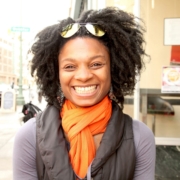“Who Wants to Be Fat Again?: Molding a Desirable Body in Nigeria”
This research seeks to situate older and newer Nigerian body ideals and modifying practices within the constellation of aesthetics, health, technology, and cultural influences locally, regionally, continentally, diasporically, and more generally. Nigeria is experiencing a shift in what constitutes the ideal body size, shape, and the best means for attaining such a body. The “good”—desirable, beautiful, ideal—body has traditionally been idealized as a bigger body in many parts of the world (Cassidy 1991), including Nigeria.
The 2001 crowning of Nigeria’s Agbani Darego, the first indigenous African Miss World, facilitated Nigerian imaginings of slimmer bodies as good, beautiful, and ideal. Paying attention to the positioning of participants during the Calabar Carnival, known as the biggest African street party, reveals shifts in the ways that bodies are differently valued in Nigeria. Alongside negotiations of size, Nigerians also navigate ideal body shapes and tones. Social media activity on platforms like Instagram, Twitter, and WhatsApp reveal that size, shape of the body and modification techniques for achieving a particular shape continue to be important considerations for desirability, sex appeal, aesthetic ideals, and even health outcomes.
The project seeks to investigate the current techniques for shaping and maintaining a particular body size and shape alongside the factors and influences facilitating and sustaining these shifts and new ideals.
Researcher
Ugo F. Edu
Ugo F. Edu is a medical anthropologist working at the intersection of medical anthropology, public health, black feminism, and science, technology, and society studies (STS). Using interdisciplinary approaches, her scholarship focuses on reproductive and sexual health, gender, race, aesthetics, body knowledge, and body modifications. Her book project: The “Family Planned”: Racial Aesthetics, Sterilization, and Reproductive Fugitivity in Brazil, traces the influence of an economy of race, aesthetics, and sexuality on reproductive and sterilization practices of women in Brazil. She is an Assistant Professor in the African American Studies Department.
Photo caption: An Efik Woman statue that stands in Calabar, capital of Cross River State and one of the many places in Southeastern Nigeria where the practice of the Fattening Room was popular. Photo by Aniekan Johnson.



